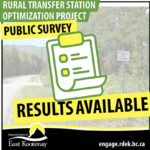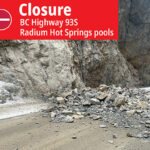Home »

Adolescent Health Survey results for region released
East Kootenay regional results from the 2023 BC Adolescent Health Survey (BC AHS) were released last week by McCreary Centre Society.
The survey, which happens every five years, was completed by 38,500 students aged 12–19 across B.C. The East Kootenay report is one of 16 regional reports of the 2023 BC AHS results. It shares data provided by students in Grades 7–12 in Southeast Kootenay, Rocky Mountain, Kootenay Lake, and Conseil scolaire francophone de la Colombie-Britannique.
The survey findings show that in comparison to pre-COVID, youth in East Kootenay are less likely to report positive mental health; and are more likely to experience disordered eating, and engage in deliberate self-harm.
In the past 12 months, 18% of local youth did not access mental health services when they felt they needed them.
McCreary Centre Society’s Executive Director and co-author of the East Kootenay report, Dr. Annie Smith explained: “It is definitely not unique to this region to see young people struggling with their mental health, but is really worth focusing on from a local perspective, especially when we look at the reasons youth are not accessing the services and supports that could help them.”
Smith added: “When we asked these youth why they had not accessed the services they felt they needed, the number one reason was because they did not want their parents to know. We also saw an increase in those reporting that they did not access these services because their parents would not take them.
“This is particularly concerning to me as we see a higher percentage of youth in East Kootenay reporting they have an anxiety disorder, ADHD, depression, and a substance use addiction than we typically see across B.C. But our data also clearly shows what a positive support families can be when youth are struggling.
“We also know that locally most young people do feel connected to their family, have supportive adults in their lives, and feel that they have someone to turn to when they need help. These supportive relationships are so important and are strongly linked to youth reporting much more positive outcomes including feeling hopeful and having positive plans for their future.”
Having enough sleep and access to healthy food can also positively influence mental health.
In East Kootenay, the percentage of youth who slept for at least eight hours continued to decrease (e.g., 42% got eight or more hours of sleep the night before taking the survey vs. 56% in 2013). Also, the percentage who skipped breakfast on school days increased (34% vs. 20% in 2018).
Despite these concerning findings, the survey results also offered some good news for the region, as the percentages of students who had engaged in sexual activity or used substances decreased. For example, there were decreases from five years earlier in the percentage of youth who had tried alcohol, tobacco, cocaine, ecstasy/MDMA, and hallucinogens.
Some key findings for East Kootenay:
- East Kootenay is less diverse than many parts of the province. However, the percentage of youth who identified as being of European heritage continued to decrease (56% vs. 63% in 2018 vs. 71% in 2013).
- There was an increase in East Kootenay youth who identified as a gender and sexual minority. For example, the percentage who identified their sexual orientation as straight decreased from 82% in 2018 to 76%.
- Compared to five years earlier, East Kootenay youth were more likely to be living in households with their grandparents (nine per cent vs. six per cent in 2018). They were also more likely to have caretaking responsibilities for a relative on a typical school day (24% vs. 19%).
- Youth were generally less likely to feel safe at school and connected to school than in previous survey years. For example, the percentage who felt safe in school washrooms decreased from 85% in 2018 to 65%. They were also less likely to plan to pursue post-secondary education (e.g., 68% vs. 80% in 2018).
- Historically, East Kootenay youth have been more likely than youth across B.C. to be sexually active and use substances. This was still the case. However, local youth were less likely to have engaged in oral sex and sexual intercourse than in previous years (e.g., 21% had engaged in sexual intercourse vs. 28% in 2018 and 2013). They were also less likely than local youth five years earlier to have smoked tobacco (23% vs. 28% in 2018), drunk alcohol (51% vs. 57%), used cocaine (three per cent vs. five per cent), ecstasy/MDMA (two per cent vs. six per cent), and hallucinogens other than mushrooms (three per cent vs. five per cent).
- Overall, there was a local decrease in youth who participated in extracurricular physical activity in the past 12 months. However, local youth remained more likely than those across B.C. to participate at least weekly in informal sports (61% vs. 53% provincially) and extreme sports (24% vs. 12%). They were also more likely to be able to swim (three per cent could not swim at all vs. nine per cent across B.C.).
- There was a decrease in the percentage of youth who rated their overall health and mental health positively. For example, 57% rated their mental health as good or excellent, compared to 73% in 2018 and 82% in 2013.
- The percentage of youth who self-harmed in the past year continued to increase (27% vs. 21% in 2018 vs. 17% in 2013). However, there was a local decrease from five years earlier in those who attempted suicide during this time (six per cent vs. eight per cent in 2018).
- Young people had fewer in-person friends and generally felt less connected to their community and school than in previous survey years. However, East Kootenay youth were more likely to have an adult outside their family they could talk to if they had a serious problem (39% vs. 32% in 2018).
East Kootenay survey results highlight some of the factors that can negatively impact health and well-being, such as experiencing deprivation; as well as the value of exercise, sleep, and access to healthy food. The results also clearly show the importance of youth feeling connected to family, culture, school, and community.
Read the full results for East Kootenay.
e-KNOW







